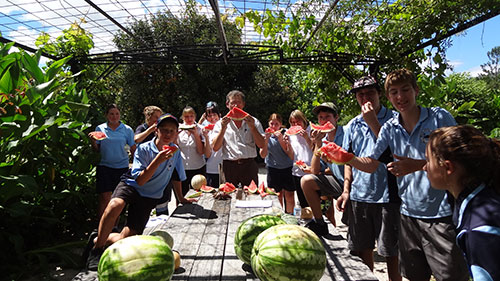Have you ever thought about living forever?
As I have entered into my third (and final) stage in life, death versus immortality has occasionally crossed my mind. While not hurrying on my own demise, I don’t think I want to live beyond my reasonable Use-By-Date. However, I do not wish to impose this same view onto others.
…. and there are some things that I do wish will go on living forever. One of these is that medium in which we grow most of our food, our soils.
Without soil lasting forever, animals including people cannot last forever. In many ways our last fifty years of land stewardship in Australia has produced great abundance, but sustainability has been secondary to production.
Every farmer knows that nature can deal some cruel cards. Weather is one of the cruellest players. Our agriculture has been developed towards the average expectations from the weather and so extreme variations leave us shaking our heads, lamenting our bad luck, and wondering what to do next. Many farms lack resilience, and many farmers turn to despair.
At the other end of our first-world human food chain, past the farms, freighters and factories, are the supermarket shelves, with their abundance of foods, mostly processed and packaged. They are pristine, glossy, taste enhanced, designed to tempt the eye, the taste buds and the wallet. Chemistry and display has extended their shelf life and enhanced the cosmetic appeal of much of our “modern” foods.
Can this system of factory farming last forever? Some farmers I have spoken with think that it can. They see our current agricultural systems as being the pinnacle of human ingenuity and productivity. Big farms, big machines, synthetic fertilizers and bio-chemicals, have produced, what in their eyes, is the best of food systems. Our soils have been tamed into obedience and whenever nature threatens or challenges our systems we seek another manufactured solution.

Permaculture Teacher, Rick Hutton enjoying fresh watermelon at The River House food forest in Bingara with students from Bingara Central School, March 2013. "Amazingly, for one of the high school students it was the first time he had tasted fresh watermelon." said Rick.
In our Gwydir Shire, the trend in our agriculture that I have observed over the past 25 years, has supported this view. Farms have doubled in average size. Monocultures, that is the reliance on a single product enterprise, have become the norm. The health of the soils has been less important than the volume of product extracted from them, and consideration of the “farm system” that the next generation will inherit in twenty or so years, has become secondary to what the current farmer has to face up to, tomorrow.
“That’s just the way it is,” I have been told by defenders of this system. “We are price takers. We have to play with the cards we have been dealt. You don’t know how tough it is,” has been their response. Fair comment, but is it also an excuse for not doing anything different? Pride, a feeling of vulnerability and even shame, might also colour these responses.
Many farmers feel isolated, powerless and ignored. They bat on because they feel a love and a responsibility for the land. But they are no longer “engaged” with those that consume their produce and probably feel that consumers just don’t care about the efforts they have made.
Sadly most farmers refuse to consider this and many farmers prefer to believe that there is only one agricultural possibility for their land, and that no others are worth considering.
Twenty years ago I was introduced to the concept of Permaculture.
Permaculture (PC) is a design concept initiated in Tasmania, Australia by Bill Mollison and David Holmgren. It seeks its inspiration from nature, and accepts that nature has had a long time to work out ways for environments to be productive and sustainable.
Permaculture means permanent agriculture, and even more generally, permanent culture. PC sees that a very important role for mankind, especially our farmers, is to work with nature to perfect lasting, productive, biologically balanced food systems.
The rangelands and broad-acre croplands, that are the most prominent of the farmlands in Gwydir Shire, are a last frontier for Permaculture. It is easier to design PC food systems for the coastal plains, for the rainforests, the steep mountains and even for the deserts, than it is for farms in our local area. Even the cities are easier to design food systems for because there the production expectations are less, the spare resources are proportionately greater, and the number of interested people more numerous.
How can a Permaculture system be developed within Gwydir Shire? Firstly, adopt an open minded view. Do not see, the PC principles as unusual ideas or threats, but as opportunities to imagine and consider. Freedom to consider alternatives is the one great, free asset we still have.
Secondly, start small. Start with the garden patch near the farmhouse. Remember that fifty years ago that garden patch provided most of the fresh fruit and vegetables consumed by the farm families. I say families because fifty years ago most farmers in this region shared their farm with a farm worker family or two. The modern farm system has been accompanied by a decline in rural population.
Often the house garden included vegetables, fruit trees, and chooks. Some had other small scale livestock and the farm family, including the kids, all had special chores to do. Were farm families healthier and happier in those days? Were they more “in-tune”with nature? Were they more resilient, confident, adaptable and open minded? Were they more free spirited and optimistic about the farm?
How would it be if we aspired to re-engage with those farm food systems of fifty years ago? More so, how would it be if we combined that system of yesteryear with the support of technology and new knowledge we have today?
This is food for thought. I invite you to please consider. Engage your imagination, you skills and your experiences and ask, ….What if? Share your thoughts with your families and your neighbours.
It is an open question, with no set answers. There are many people out there who have commenced this process, some without knowing it or even naming it. They just do it…because it feels right.
Remember, the longest journey begins with the first step. Are you interested in an adventure?
Submitted by Permaculture Teacher – Rick Hutton – 1 Argoon Street, Bingara NSW.



